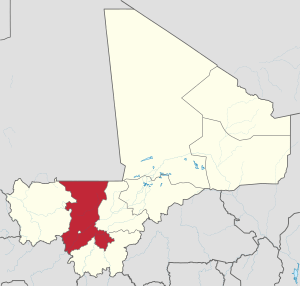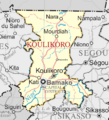Koulikoro Region facts for kids
Quick facts for kids
Koulikoro Region
|
|
|---|---|
|
Region
|
|

Location within Mali
|
|
| Country | |
| Capital | Koulikoro |
| Area | |
| • Total | 90,120 km2 (34,800 sq mi) |
| Population
(2009 census)
|
|
| • Total | 2,418,305 |
| • Density | 26.8343/km2 (69.500/sq mi) |
| Time zone | UTC±0 (UTC) |
The Koulikoro Region is a large area in western Mali, a country in West Africa. It is the second biggest administrative region in Mali. This means it's like a big state or province. The region covers about 90,120 square kilometers (34,795 square miles). That's a lot of land! The main city and capital of this region is Koulikoro.
Contents
Geography and Location
The Koulikoro Region is located in the western part of Mali. It shares borders with several other regions of Mali. To the north, it meets the Kayes Region and the country of Mauritania. To the south, it borders the Sikasso Region. The Ségou Region is to its east.
The Niger River
A very important river, the Niger River, flows through the Koulikoro Region. This river is like a lifeline for the people living there. It helps with farming and transportation. Many towns and villages are built along its banks.
Climate and Landscape
The region has a tropical climate. This means it's usually warm or hot all year round. There are two main seasons: a dry season and a rainy season. The landscape includes plains and some hills. You might see a mix of dry grasslands and areas with more trees, especially near the river.
People and Culture
The Koulikoro Region is home to many different groups of people. These groups have their own unique cultures and traditions. They live together and share the land.
Languages Spoken
Many languages are spoken in the region. The official language of Mali is French. However, local languages like Bambara are also very common. People often speak both.
Daily Life
Most people in the Koulikoro Region work in farming. They grow crops like millet, sorghum, and rice. Some people also raise animals like cattle and goats. Fishing is important too, especially along the Niger River. There are also markets where people buy and sell goods.
Cities and Towns
The capital city is Koulikoro. It's an important center for trade and transportation. Other notable towns in the region include Kati, Kolokani, and Nara. These towns often have local markets and serve as centers for the surrounding villages.
Administrative Divisions
The Koulikoro Region is divided into smaller areas called cercles. Think of these as smaller districts within the region. Each cercle has its own main town. This helps with managing the region and providing services to the people.
Economy and Resources
The economy of the Koulikoro Region is mainly based on farming. The fertile land and the Niger River help a lot with this.
Agriculture
Farmers grow a variety of crops. These include grains like millet and sorghum, which are important for food. They also grow rice, especially in areas near the river. Cotton is another important crop that is grown for sale.
Other Activities
Besides farming, some people work in small businesses. There's also some mining in certain parts of the region. The Niger River is used for transporting goods and people. This helps connect the region to other parts of Mali.
Images for kids
See also
 In Spanish: Región de Kulikoró para niños
In Spanish: Región de Kulikoró para niños
 | Georgia Louise Harris Brown |
 | Julian Abele |
 | Norma Merrick Sklarek |
 | William Sidney Pittman |



